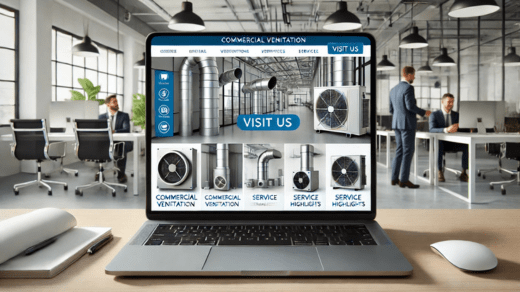Benefits of Good Air Quality in the Workplace
In a workplace, the quality of air can significantly impact the well-being and performance of employees. Good air quality is not just a matter of comfort; it can also lead to improved health outcomes and increased productivity. Employees in spaces with clean, well-ventilated air are often more alert and focused, leading to better decision-making and overall satisfaction in their roles.Furthermore, investing in good air quality can help reduce the number of sick days taken by employees. Proper ventilation systems can decrease the spread of airborne illnesses and allergens, creating a healthier environment for everyone. By promoting a workspace with fresh, clean air, employers can foster a culture of well-being and demonstrate that they prioritize the health and happiness of their team members.
Commercial Ventilation is essential for maintaining good air quality in the workplace. Clean, well-ventilated air can improve employee well-being and performance, leading to increased productivity and reduced sick days. Investing in proper ventilation systems can create a healthier and happier work environment for all.
The Impact of Proper Ventilation on Employee Productivity
Proper ventilation in the workplace plays a crucial role in enhancing employee productivity. When indoor air quality is optimized through efficient ventilation systems, employees are less likely to be exposed to pollutants or stuffy environments that can cause discomfort and distraction. Clean, fresh air circulating throughout the workspace can help employees stay alert, focused, and energized, ultimately leading to improved performance and output.Additionally, adequate ventilation can contribute to a more comfortable and pleasant working environment, which can have a positive impact on employee morale and motivation. When employees feel physically comfortable in their workspace with proper airflow and ventilation, they are more likely to be satisfied with their surroundings and experience higher levels of job satisfaction. This, in turn, can lead to increased engagement, creativity, and overall wellbeing, all of which are essential factors in boosting productivity levels within a company.
Creating a Healthy Work Environment Through Adequate Ventilation
Proper ventilation in the workplace plays a crucial role in creating a healthy and conducive environment for employees. When indoor air is adequately circulated, it helps in reducing the buildup of pollutants and airborne particles that can detrimentally impact employees’ health and well-being. Improved air quality can lead to fewer instances of respiratory issues, allergies, and overall sickness, thereby promoting a healthier workforce.Moreover, adequate ventilation fosters a comfortable atmosphere that can enhance employee morale and productivity. Employees are likely to feel more energetic and focused when they are working in an environment with fresh air circulation. This boost in concentration can lead to increased efficiency in tasks, ultimately contributing to the overall success of the organization. By prioritizing proper ventilation, companies can show their commitment to creating a workspace that supports the health and performance of their employees.
Reducing Sick Days with Improved Ventilation Systems
Effective ventilation systems play a crucial role in reducing sick days among employees by improving indoor air quality. Poor ventilation can lead to the accumulation of pollutants and pathogens in the air, increasing the risk of respiratory issues and illnesses. By investing in improved ventilation, businesses can create a healthier work environment that supports the well-being of their employees.Fresh air circulation facilitated by proper ventilation not only reduces the spread of airborne illnesses but also promotes overall respiratory health. When employees are exposed to clean, well-ventilated air, their immune systems are better equipped to fight off infections, resulting in fewer sick days taken. By prioritizing ventilation systems, employers demonstrate a commitment to the health and wellness of their workforce, ultimately leading to a more productive and engaged team.
Enhancing Concentration and Focus with Fresh Air Circulation
Fresh air circulation plays a vital role in creating a conducive environment for employees to enhance their concentration and focus in the workplace. When the air is stale and lacking proper ventilation, it can lead to drowsiness and a decrease in productivity. By ensuring a steady flow of fresh air, employees can feel more alert and attentive to their tasks, leading to improved work performance.Moreover, fresh air circulation helps in maintaining optimal oxygen levels in the workplace, which is essential for brain function and cognitive abilities. When employees have access to clean, fresh air, they are better equipped to stay focused and engaged throughout the day. This can result in higher efficiency, better decision-making, and overall sharper mental acuity, ultimately contributing to a more productive and successful work environment.
Natural Home Solutions play a crucial role in enhancing concentration and focus in the workplace. Fresh air circulation ensures employees are alert and attentive, leading to improved productivity. Optimal oxygen levels from clean air support brain function, resulting in sharper mental acuity for a more successful work environment.
Boosting Employee Satisfaction with Better Air Quality
Employee satisfaction is a vital aspect of a productive work environment. One often overlooked factor that significantly contributes to employee satisfaction is the quality of indoor air. Poor indoor air quality can lead to discomfort, health issues, and reduced productivity. When organizations prioritize better air quality through improved ventilation systems, employees experience a boost in their satisfaction levels.Improved air quality not only enhances physical comfort but also positively influences mental well-being. Clean, fresh air circulation can create a more inviting and energizing atmosphere, promoting a sense of contentment among employees. As a result, employees are more likely to feel motivated, focused, and engaged in their work tasks, ultimately contributing to a more positive and productive workplace environment.
Improving Overall Mood and Wellbeing with Proper Ventilation
Proper ventilation plays a crucial role in enhancing the overall mood and wellbeing of employees in the workplace. When indoor air quality is optimized through effective airflow systems, the atmosphere becomes fresher and more invigorating. This leads to a noticeable boost in positivity and energy levels among staff members, creating a more vibrant and uplifting environment that fosters wellbeing.Moreover, good ventilation helps in reducing the presence of pollutants and odors in the workplace, which can have a significant impact on individuals’ mental and emotional state. By promoting cleaner and healthier air circulation, employees are less likely to experience irritations or discomfort that can contribute to feelings of unease or stress. Ultimately, prioritizing proper ventilation not only improves the physical health of workers but also contributes to a more harmonious and pleasant atmosphere that supports their overall mood and wellbeing.
Promoting Collaboration and Teamwork through Good Indoor Air Quality
Good indoor air quality plays a significant role in fostering collaboration and teamwork in the workplace. When employees are exposed to fresh, well-ventilated air, they are more likely to feel invigorated and engaged, leading to a positive impact on their interactions with colleagues. Proper ventilation helps create a comfortable and conducive environment where ideas can flow freely, encouraging teamwork and fostering a sense of unity among team members.Moreover, when the air quality is maintained at a high standard, employees are less likely to feel fatigued or distracted by stuffy or stale air. This improved concentration and alertness, resulting from good indoor air quality, enable teams to work cohesively and efficiently towards common goals. By prioritizing proper ventilation systems in the workplace, employers can contribute to a culture of collaboration, communication, and mutual support among employees, ultimately enhancing overall teamwork and productivity.
Preventing Fatigue and Burnout with Effective Ventilation
Effective ventilation plays a crucial role in maintaining a conducive work environment that fosters employee well-being and productivity. By ensuring proper airflow and air quality, businesses can significantly reduce the risk of fatigue and burnout among their staff. Fatigue and burnout not only affect individual performance but also have broader organizational implications, making ventilation systems a key investment for long-term success.When indoor spaces are well-ventilated, employees can breathe in fresh, clean air that supports their cognitive function and overall health. Poor ventilation, on the other hand, can lead to a build-up of pollutants and stale air, contributing to fatigue and decreased mental sharpness. By prioritizing effective ventilation systems, businesses can create a work environment that promotes employee alertness, focus, and energy levels, ultimately reducing the likelihood of burnout and maximizing productivity levels.
Increasing Employee Engagement and Retention Rates with Adequate Airflow
Employee engagement and retention are crucial factors in maintaining a thriving work environment. Adequate airflow plays a significant role in fostering these aspects within a company. When employees are provided with fresh, well-ventilated spaces, they are more likely to feel energized and motivated, leading to increased productivity and job satisfaction.Good indoor air quality not only contributes to physical health but also has a profound impact on mental wellbeing. With proper ventilation systems in place, employees are less likely to experience fatigue and burnout, allowing them to stay focused and engaged in their work. By prioritizing airflow in the workplace, employers can create a conducive atmosphere for collaboration, creativity, and overall job fulfillment, which ultimately leads to higher employee retention rates.



